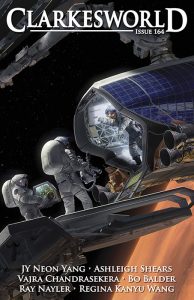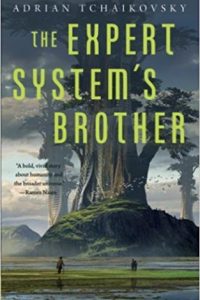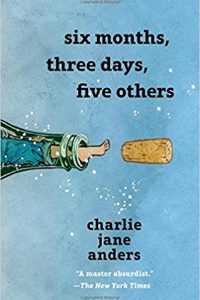Karen Burnham Reviews Short Fiction: Strange Horizons, BCS, Lightspeed, Clarkesworld, and Tor.com
 Strange Horizons 4/6/20, 4/13/20, 5/11/20, 5/19/20
Strange Horizons 4/6/20, 4/13/20, 5/11/20, 5/19/20
Beneath Ceaseless Skies 4/23/20, 5/7/20, 5/21/20, 6/4/20
Lightspeed 5/20, 6/20
Clarkesworld 5/20
Tor.com 4/29/20, 5/13/20, 5/20/20
Strange Horizons leads off in April with a fascinating tale centered on abstract philosophy and its intersection with life. ”The Pride of Salinkari” by Elizabeth Crowe imagines a world where philosophy is central and people are taught the value of ending their lives at their moment of highest achievement, a judgement only they can make. When one younger award-winning poet commits suicide, his family sues his ethics teacher for misguiding him. The story is of the teacher’s reaction to that death and what happens to him when he’s taken to trial. The tale concretizes some rather abstruse issues very clearly. In ”The Longest Season in the Garden of the Tea-Fish”, Jo Miles imagines a very different world, one where trees have become animate and sentient through a symbiosis with a certain kind of fish. The fish must complete its lifecycle outside of the trees, so when the main pond in which they live becomes toxic to them, almost all the trees have to go into a kind of hibernation while one remains awake to try to nurture the fish population back to life. This character portrait of a mother struggling alone through repeated adversity is a lovely story of persistence.
May had two very strong stories, first ”Martian Cinema” by Gabriela Santiago. I’ve read a lot of stories about kids on Mars, but it’s rare to find any as inventive as these. Bored kids go exploring and find a cave painting down in the caverns beneath their habitat. They start incorporating it into elaborate stories, bringing down different items they’ve scavenged to make real-world special effects, from sound to lighting and even colored pyrotechnics. It turns into a full-scale, long-running theatrical production looping in all the kids in the colony. Eventually they’re caught by their parents, but who else has been watching them in the meantime? Finally there’s ”The DEATH/GRIP Challenge” by Johnny Compton. This story starts out featuring the sweet relationship between a young woman and her dad who lost a hand, with an internet meme based on a really bad horror movie becoming a running joke between the two of them. Things take a much darker turn as people start mutilating themselves live on social media and her dad becomes more and more obsessed with the meme. The really great father/daughter relationship built up over the course of the story makes the horror climax all the more powerful when it arrives.
Beneath Ceaseless Skies issues for April and May follow a stellar run in March with their science fantasy double-double set and 300th issue. In issue #302 I was particularly impressed by ”Lonely Children Lost at Sea” by Wendy Nikel. The setup is intriguing: an island populated by people who washed ashore as juveniles after shipwrecks; now some of them are grown and nurturing and educating newcomers. Loraine’s best friend Gina has married Tim and is desperate for a child of her own. When a new wreck appears on their shores, she immediately adopts an uncommunicative 11-year-old girl, determined to raise her herself away from the other foundlings. This is a tragic story with a poignant character portrait of the relationship between Loraine and Gina and how it’s changed as they’ve aged.
Issue #303 has a pair of stories focused on motherhood in different ways. ”February Moon” by Josh Rountree imagines a woman in long-ago Texas, her husband and older son vanished and two children left to raise as something is terrorizing the livestock. She is a German immigrant in a community where most families have been established for multiple generations; she’s at a linguistic disadvantage, and without a husband on view (assumed dead by many), other men are looming. Eventually her story ties back into an old-world European fairy tale (it would be a spoiler to say which one), but I felt that the character portrait of a mother doing her best in trying circumstances came through clearly. Then in ”Fox Red, Life Red, Teeth Like Snow” by Devin Miller, we encounter a troll, Hryggda, on her way home to her wives after switching a baby for a changeling. They have a very different gender framework, but more importantly, she is being followed by a wolf that’s hunting the Moon. Hryggda’s actions to protect the Moon even while she’s worried about the babe she’s absconded with are very interesting; it would be even more interesting to see how the child grows up in such circumstances.
Issue #304 contains stories within stories within stories. ”Clever Jack, Heavy with Stories” by R.K. Duncan imagines lower-class Jack and his noble born best friend Rowland. They are inseparable by nature, even after Rowland is put into an arranged marriage at age fourteen to a much older woman. When Rowland is captured by the King of Elf-land and his wife soon after him, Jack knows he must rescue them, but he takes the time to prepare himself first. Girded with his mother’s gifts and a crone’s stories, he might win through to his objective in the fae lands, but there’s a lot that has to go right and little that can go wrong. I’ve appreciated the stories Duncan has had in BCS so far, and this one ramps up the tension and resolves the relationships very nicely. In ”The Honey of the World and the Queen of Crows” by Dimitra Nikolaidou, a dying soldier finds himself at a crossroads populated by a bartender and a very irreligious nun. The bulk of the story is the nun’s and how she came to inhabit her role, and through that we learn about the bartender and what they’re offering to the soldier. This is a very strange version of the near-death, met-at-the-crossroads story, but quite well done.
”The Widow” by Emma Törzs in issue #305 imagines a poor woman in a world like pre-revolution-era France. Her husband is horribly abusive and also a shape-shifter. He becomes the poster child for a particular treatment, but another doctor enlists the wife in a scheme to discredit the treatment. She agrees, but is also able to turn the situation to her own advantage.
The SF side of Lightspeed in May includes ”Melting Like Metal” by Ada Hoffman. In this world a godlike AI recruits ”angels” to become cyborg entities to enforce order. Enga was autistic before recruitment and almost doesn’t survive the transformation, but is eventually built up to useful service. The story is about her intensely subjective experiences of the situation she’s in as she engages in a hunt for a particular heretic, one who has tech designed to optically interfere with her cybernetic systems. She is wrestling with the limitations placed on her, and there’s no telling what the future will hold for her. On the fantasy side we have ”The Fenghuang” by Millie Ho. Two women with very peculiar illnesses meet in hospital in Hong Kong. Candice has manifested a phenomenon where she sometimes self-immolates, completely to death, then painfully resurrects. She quickly winds up on psychiatric drugs to keep her from entering any risky emotional state. Fiona is instead being eaten from the inside by some kind of irremovable mass in her abdomen. They part ways as Candice has to struggle to advocate for herself to her mother and doctors; eventually they meet again as Fiona is being taken to the verge of death by her affliction. I felt the ending to be unsatisfying, not coming to a full resolution, but the picture of the two women struggling together and apart is well done.
In June we get ‘‘Real Animals”, a debut story by Em North. This is a character portrait of two friends, Raffi and Kay, in a rural Montana town almost desolate in a world where aliens have possessed animals and largely turned them against humans. Against this backdrop Kay has turned a hunting lodge into a memorial garden where the taxidermied bodies of the townsfolk are remembered by the few survivors. Raffi’s husband was killed and preserved, and she’s been living with Kay and her hunter husband Buck ever since. It’s an intimate story of a friendship that has evolved over time set against a very grim and surreal backdrop. Ben Peek gives us a real page-turner in ”Refuge”, framed as a critique of a biography of the mercenary general Aned Hearst. The letter-writer was his original biographer, much closer to the events that the more recent biography apparently mangled. We get the story of how Hearst, the sole survivor of the company limping back to a town with a metal leg, was able to save a group of orphans and start rebuilding his company through sheer smarts and chutzpah.
Clarkesworld in May opens with a charming story of robots who have outlived their master and are trying to maintain the pretense of normality to prevent anyone from repurposing them. ”What Happens in Solarium Square 21” by Ashleigh Shier gives us Xohan, trying to stay functional without accepting the power upgrade offered by Sholo, all while trying to keep ”the Body” presentable and up to a normal routine. The dialog between all the household systems is delightful and it’s easy to root for these scrappy cheaters. Ray Nayler gives us ”Albedo Season”, where a woman has figured out a key aspect of the ecosystem of the moon where she is part of a small colony only barely eking out a living. While the story is mostly worldbuilding, and it’s a fascinating bit of speculative construction, there is also inherent drama in her having to marshal all her scientific evidence and her knowledge of the personalities involved to convince the community to act. This is obviously a classic construction for a science fiction story, but it takes on a lot of added weight in our age of urgent climate change concerns. Bo Balder gives us a science fiction mystery story in ”Quantum Fish”. Havi is returning to her homeworld, a mostly water planet focused on high-end aquaculture with fish delicacies sold all over nearby space. Even on the space station above the planet she can tell something is wrong, and it turns out that imports from the planet below have almost stopped. Going back to her somewhat estranged family, the mystery deepens as she notices many more changes that have subtly built up over time. Everything comes to a head when the planet comes under attack, and it turns out the fish might be vital to the planet in more ways than one. A lovely puzzle.
”The Language Sheath” by Regina Kanyu Wang, translated by Emily Jin and the author, deftly weaves together multiple concerns about language, culture, and family. The narrator is a translator of Kemorean, a language in danger of being overwhelmed by English. She is fiercely protective of the language, embodying as it does for her everything important and distinct about her culture. Unfortunately her son had originally been sent to an international boarding school and taught in English until her divorce when he was farther along in his schooling. Despite coming home to go to a Kemorean school, he cannot learn to speak the language to her exacting standards. The mother is hired to speak Kemorean eight hours a day so that an automatic translation program can develop a ”language sheath” that will allow translations to be elegant and appropriate, not just technically correct. We get her stream-of-consciousness concerns and her history as she has fallen into deep alcoholism, and we also get her son’s perspective on what’s happening. It is heart-wrenching. Equally sobering is ”The Translator, at Low Tide” by Vajra Chadrasekera. The titular character, trying to translate poetry for the few markets still publishing, is watching his city decay both ecologically and culturally, the sea encroaching from one side and feral children diving into savagery in the weedy playground outside his apartment building. This is an intense, political, bitter look at the future–not a pleasure, but very well done.
Tor.com gives us ”Anything Resembling Love” by S. Qiouyi Lu, a story that makes our discomfort with unwanted touch something specific and concrete in a world where people manifest that discomfort with vermin crawling out of them. Sylvia’s body creates centipedes when people touch her wrongly, but of course she’s socialized to hide them at all costs. This causes her no end of problems when she comes into sexual maturity in high school and college. The story viscerally expresses the dramatic differences in how men and women are taught to express themselves and how they move through the world. ”Benjamin 2073” by Rjurik Davidson imagines a relatively hopeful future where climate change is being mitigated in many ways. The only problem is that even in this environment it is hard to get funding for research to bring back the extinct thylacines, and Ellie, a scientist with severe muscular atrophy who uses an exoskeleton to get around, has a huge amount of personal investment in the project. With only one assistant left after multiple failures, will she ever see the project come to fruition in the face of a skeptical administration? I thought that the way Davidson chose to bookend the story was a nice touch. We also get a new story by Yoon Ha lee, ”Beyond the Dragon‘s Gate”. Here Anna, a researcher, is politely abducted and asked to diagnose some problem AIs that have gone rogue with the newest generation of classified military starships. Anna is able to contact the AI and start to understand its very interesting perspective.
Finally I hope you’ll forgive me a small tribute to someone you’ve likely never met. This is my first time ever writing for Locus without my dog Hazel curled up under my desk. She was a six month old puppy when I first met Charles Brown, Liza Trombi, and Gary K. Wolfe at the 2006 Los Angeles WorldCon, and she had been my constant writing companion ever since. She passed away peacefully in her sleep this week at the age of 14 years, and she will be sorely missed.
Recommended Stories
”The DEATH/GRIP Challenge”, Johnny Compton (Strange Horizons 5/19/20)
”The Pride of Salinkari”, Elizabeth Crowe (Strange Horizons 4/6/20)
”Clever Jack, Heavy with Stories”, R.K. Duncan (Beneath Ceaseless Skies 5/21/20)
”Refuge”, Ben Peek (Lightspeed 6/20)
”February Moon”, Josh Rountree (Beneath Ceaseless Skies 5/7/20)
”Martian Cinema”, Gabriela Santiago (Strange Horizons 5/11/20)
“The Language Sheath”, Regina Kanyu Wang (Clarkesworld 5/20)
Karen Burnham is an electromagnetics engineer by way of vocation, and a book reviewer/critic by way of avocation. She has worked on NASA projects including the Dream Chaser spacecraft and currently works in the automotive industry in Michigan. She has reviewed for venues such as Locus Magazine, NYRSF, Strange Horizons, SFSignal.com, and Cascadia Subduction Zone. She has produced podcasts for Locusmag.com and SFSignal.com, especially SF Crossing the Gulf with Karen Lord. Her book on Greg Egan came out from University of Illinois Press in 2014, and she has twice been nominated in the Best Non Fiction category of the British SF Awards.
This review and more like it in the July 2020 issue of Locus.
 While you are here, please take a moment to support Locus with a one-time or recurring donation. We rely on reader donations to keep the magazine and site going, and would like to keep the site paywall free, but WE NEED YOUR FINANCIAL SUPPORT to continue quality coverage of the science fiction and fantasy field.
While you are here, please take a moment to support Locus with a one-time or recurring donation. We rely on reader donations to keep the magazine and site going, and would like to keep the site paywall free, but WE NEED YOUR FINANCIAL SUPPORT to continue quality coverage of the science fiction and fantasy field.







